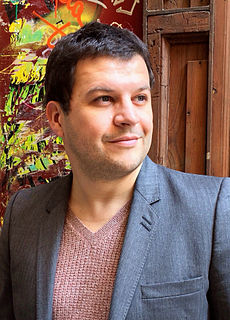A Quote by Alexandra Fuller
Once, I discovered the skulls of two impala rams, their horns locked into an irreversible figure-of-eight; the two animals had been trapped in combat, latched to each other during the battle of the rut. The harder they had pulled to escape from each other, the more intractably stuck they were, until they had fallen exhausted, to their knees, in an embrace of hatred that had killed them both.
Related Quotes
They say you cannot love two people equally at once,” she said. “And perhaps for others that is so. But you and Will—you are not like two ordinary people, two people who might have been jealous of each other, or who would have imagined my love for one of them diminished by my love of the other. You merged your souls when you were both children. I could not have loved Will so much if I had not loved you as well. And I could not love you as I do if I had not loved Will as I did.
We were locked onto each other as though we had just discovered this incredible thing you could do with two mouths pressing close and moist against each other. And the taste of him... Horrifyingly, unbearably sweet -- sweet in the way crack must feel hitting the bloodstream of an addict after years of staying clean.
I will tell you what, the Rock was my nemesis. We did enough for each other; we put each other over to be famous. If we didn't have that feud with each other, we wouldn't have had the success we both had in pro wrestling. We really did build each other. I'm very thankful we had those opportunities and those matches.
They were now both ready, not to begin from scratch, but to continue with a love that had survived for thirteen years in hibernation. They were no longer travellers without baggage. They were no longer twenty. They'd both been around the block a bit and had suffered without the other. They'd both lost their way without the other. Each had tried to find love with other people. But all that was now finished.
The lights were off so that his heads could avoid looking at each other because neither of them was currently a particular engaging sight, nor had they been since he had made the error of looking into his soul. It had indeed been an error. It had been late one night-- of course. It had been a difficult day-- of course. There had been soulful music playing on the ship's sound system-- of course. And he had, of course, been slightly drunk. In other words, all the usual conditions that bring on a bout of soul searching had applied, but it had, nevertheless, clearly been an error.
Kumiko and I felt something for each other from the beginning. It was not one of those strong, impulsive feelings that can hit two people like an electric shock when they first meet, but something quieter and gentler, like two tiny lights traveling in tandem through a vast darkness and drawing imperceptibly closer to each other as they go. As our meetings grew more frequent, I felt not so much that I had met someone new as that I had chanced upon a dear old friend.
Together they had overcome the daily incomprehension, the instantaneous hatred, the reciprocal nastiness, and fabulous flashes of glory in the conjugal conspiracy. It was time when they both loved each other best, without hurry or excess, when both were most conscious of and grateful for their incredible victories over adversity. Life would still present them with other moral trials, of course, but that no longer mattered: they were on the other shore.
They were still in the happier stage of love. They were full of brave illusions about each other, tremendous illusions, so that the communion of self with self seemed to be on a plane where no other human relations mattered. They both seemed to have arrived there with an extraordinary innocence as though a series of pure accidents had driven them together, so many accidents that at last they were forced to conclude that they were for each other. They had arrived with clean hands, or so it seemed, after no traffic with the merely curious and clandestine.
In fact, though their acquaintance had been so short, they had guessed, as always happens between lovers, everything of any importance about each other in two seconds at the utmost, and it now remained only to fill in such unimportant details as what they were called; where they lived; and whether they were beggars or people of substance.
The Andrians were the first of the islanders to refuse Themistocles' demand for money. He had put it to them that they would be unable to avoid paying, because the Athenians had the support of two powerful deities, one called Persuasion and the other Compulsion.The Andrians had replied that Athens was lucky to have two such useful gods, who were obviously responsible for her wealth and greatness; unfortunately, they themselves, in their small & inadequate land, had two utterly useless deities, who refused to leave the island and insisted on staying; and their names were Poverty and Inability.

































